
LGBTQ+ flag. (Credit: AFP archives)
This is potentially a huge shift in a country where being gay is punishable by death.
The FAQs section of Visit Saudi website includes the question “ are LGBTQ+ visitors welcome in Saudi Arabia?” The answer was yes. “We don’t ask anyone to disclose personal details and never have. Everyone is welcome to visit our country,” the website stated.
“It’s very sad to see a country criminalize the LGBT community and welcome them at the same time,” Wajeeh Assad, a Saudi LGBTQ+ activist living in exile in the United States wrote on Twitter, denouncing the double standard the policy holds for LGBTQ+ rights between Saudis and foreign visitors.
This move is part of a series of unprecedented reforms that the crown prince and de facto ruler Mohammed bin Salman (MBS) launched to change the ultra-conservative image of the kingdom.
Other reform measures include cinema openings, ending the segregation of seating areas for men and women in restaurants, organizing music festivals and limiting the once-feared morality police.
MBS hopes to make tourism a pillar of its economic diversification, as part of the Saudi Vision 2030 that aims to prepare the country for the post-oil dependence era.
But this new openness does not neutralize the discrimination suffered by the LGBTQ+ community in Saudi Arabia, where a strict interpretation of the Sharia law is implemented and judicial decisions related to morals are mostly rendered by ulama or judges.
Those convicted of homosexuality are sentenced to various harsh penalties, which include flogging and the death penalty. Two years ago, the Grand Mufti of Saudi Arabia declared homosexuality as one of the “most heinous crimes.”
Last executions in 20 years
The last capital punishment for homosexuality in the kingdom, however, took place more than 20 years ago. Three Saudis, Ali bin Hatan bin Saad, Mohammad bin Suleiman bin Mohammad and Mohammad bin Khalil bin Abdullah, were sentenced to death for “sodomy, same-sex marriage and incitement to pedophilia,” the Saudi Ministry of Interior said. They were decapitated on Jan. 1, 2002.
Since then, the crackdown on LGBTQ+ people has mostly led to arrests and physical abuse. In 2014, a 24-year-old man was sentenced to three years in prison and 450 lashes for arranging dates with other men on Twitter. After being arrested for the first time for a YouTube video in which he wore makeup, on the grounds that he was “taking on the appearance of a woman,” Saudi influencer Suhail al-Jameel was sentenced to three years in prison and 800 lashes for sharing nudity online in 2019, after he posted a photo of himself in a swimsuit on social media.
Jameel was convicted under the anti-cybercrime law that punishes online activity impinging on “public order, religious values, public morals, and privacy.”
More recently, discrimination against the LGBTQ+ community has appeared in the form of censorship. Last year, Saudi authorities seized rainbow-colored toys, including bows, skirts, hats and pencil cases.
“We are giving a tour of the items that contradict the Islamic faith and public morals and promote homosexual colors targeting the younger generation,” an official from the commerce ministry told a state-run news channel.
Saudi Arabia banned several Marvel, Disney and Pixar films, some of which includeDoctor Strange in the Multiverse of Madness, Eternals, West Side Story and Buzz Lightyear, for depicting LGBTQ+ characters.
This institutionalized discrimination echoes the recent tragedy of a young Saudi transgender woman. Eden Knight, 23, committed suicide in March after her parents hired a lawyer to manipulate her into returning to Saudi Arabia from exile in the United States.
“I did everything he asked. I cut my hair, I stopped taking estrogen, I changed my wardrobe, I spoke to my father. (…) I was so convinced I was going to hell that I read the entire Quran from cover to cover in two days, crying all the way through and repeating to myself how disgusting I was,” she wrote in her suicide note.
Unmarried couples
With the announced opening of the country to LGBTQ+ tourists, Saudi Arabia is also relaxing its moral rigor towards foreign visitors for the second time. The Visit Saudi website also reports that unmarried couples will be allowed to sleep under the same roof — a right officially denied to Saudis.
When football superstar Cristiano Ronaldo joined Riyad’s Al-Nassr football club in January, he was allowed to live with his partner Georgina Rodriguez and their five children.
This policy contrasts those adopted by Qatar during the 2022 FIFA World Cup. By banning the sale of alcohol to fans in stadiums and unmarried couples from sharing the same hotel room, Qatar had asked visitors to “respect [its] culture.”
The Qatari authorities, supported by FIFA, strictly forbade the LGBTQ+ pride flag and the One Love LGBTQ+ rights armband in and around the stadiums.
However, before the World Cup, FIFA assured that Qatar adopted measures to ensure that all forms of discrimination would be combated. Echoing the Visit Saudi statement, a Qatari government official told CNN that “everyone is welcome in Qatar.”
This article was originally published in French in L'Orient-Le Jour. Translation by Joelle El Khoury.